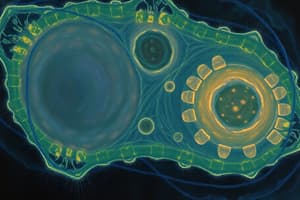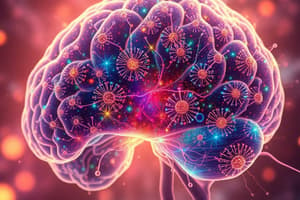Podcast
Questions and Answers
What are the building blocks of cells according to cell biology?
What are the building blocks of cells according to cell biology?
- Lipids, vitamins, minerals, sugars, and amino acids
- Chlorophyll, cellulose, starch, glucose, and cellulase
- Enzymes, hormones, antibodies, neurotransmitters, and DNA
- Proteins, nucleic acids, lipid bilayers, carbohydrates, and water (correct)
What is the main function of signal transduction pathways in cell biology?
What is the main function of signal transduction pathways in cell biology?
- Facilitate the breakdown of glucose for energy production
- Regulate the process of photosynthesis in plant cells
- Convert DNA into proteins for cellular processes
- Allow cells to communicate internally and externally (correct)
How do cells reproduce in order to maintain genetic continuity across generations?
How do cells reproduce in order to maintain genetic continuity across generations?
- Using cytokinesis and karyokinesis
- By binary fission and budding
- Via conjugation and transformation
- Through mitosis and meiosis (correct)
Which component in a cell plays a vital role in maintaining homeostasis, metabolism, and energy production?
Which component in a cell plays a vital role in maintaining homeostasis, metabolism, and energy production?
What function do organelles serve within a cell's structure according to cell biology?
What function do organelles serve within a cell's structure according to cell biology?
How do cells in multicellular organisms communicate with each other?
How do cells in multicellular organisms communicate with each other?
What is the role of signaling pathways in control and coordination mechanisms?
What is the role of signaling pathways in control and coordination mechanisms?
How do feedback loops contribute to stability in biological systems?
How do feedback loops contribute to stability in biological systems?
Which of the following is true about epigenetics?
Which of the following is true about epigenetics?
What technology aids in identifying genes and proteins involved in controlling biological processes?
What technology aids in identifying genes and proteins involved in controlling biological processes?
In biological control and coordination mechanisms, what is the role of negative feedback loops?
In biological control and coordination mechanisms, what is the role of negative feedback loops?
How do signaling pathways contribute to changes in cell behavior?
How do signaling pathways contribute to changes in cell behavior?
Study Notes
Overview of Biology Subtopics: Cell Biology and Control and Coordination
In the vast realm of biology, we delve into the fundamental processes that govern living organisms, extending our understanding from the minute scales of cells to the intricate systems of control and coordination that sustain life. Within these broad categories lie numerous fascinating concepts and discoveries that continually push the boundaries of knowledge. Let's explore these subfields further.
Cell Biology
Cell biology deals with the basic units of life known as cells. It encompasses various aspects such as cell division, growth, reproduction, communication between cells, and the relationship between cells and their environment. Key features of cell biology include:
- Structure: The building blocks of cells include proteins, nucleic acids (DNA and RNA), lipid bilayers, carbohydrates, and water. These components combine to form distinct regions called organelles, membranes, and cytoplasm.
- Functionality: Each component plays a vital role in maintaining homeostasis, metabolism, and energy production, among other essential processes.
- Reproduction: Cells reproduce through mitosis and meiosis, ensuring the continuity of genetic material across generations.
- Communication: Signal transduction pathways allow cells to communicate internally and externally, responding to stimuli and modulating responses.
- Evolution: The development of advanced technologies such as CRISPR has opened doors to studying the origins of cells, their adaptation, and diversification over millions of years.
Control and Coordination
The regulation of biological activities is primarily managed through control and coordination mechanisms. Central to this concept are regulatory molecules, signaling networks, and feedback loops. Essential elements of control and coordination include:
- Signaling Pathways: These are chains of events triggered by extracellular signals, leading to changes in gene expression, protein synthesis, or ion channel activity. Examples range from hormonal cascades to immune system activation.
- Feedback Loops: Positive and negative feedback loops maintain stability in biological systems. Negative feedback inhibits excessive response, while positive feedback amplifies weak signals.
- Epigenetics: Epigenetic modifications regulate gene expression without altering the underlying DNA sequence. Histone modification, DNA methylation, and non-coding RNAs play critical roles in this area.
- Genomics and Proteomics: Technologies such as genomics and proteomics aid in identifying genes and proteins involved in controlling and coordinating biological processes.
Both cell biology and control and coordination contribute significantly to our understanding of living organisms. From understanding the intricate details of cell structures and function to uncovering the underlying principles governing biological systems, these fields discover the bottom-up and top-down perspectives of life itself.
Studying That Suits You
Use AI to generate personalized quizzes and flashcards to suit your learning preferences.
Description
Delve into the fundamental processes governing living organisms through the study of cell biology and control & coordination in biology. Explore topics such as cell structure, functionality, reproduction, communication, signaling pathways, feedback loops, epigenetics, and genomics/proteomics.




